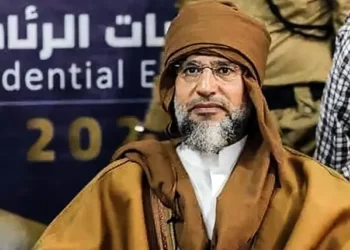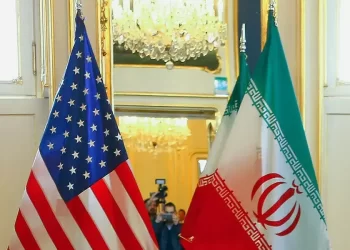WASHINGTON (news agencies) — Vice President Kamala Harris has repeatedly taunted her opponent’s seeming reluctance to debate, telling a series of raucous audiences about Donald Trump’s criticisms of her: “As the saying goes, if you’ve got something to say, say it to my face.”
After first backing out of an agreement, Trump reversed himself and said he’d meet Harris on Sept. 10 for an event hosted by ABC. That sets up a long-anticipated faceoff between the Democratic and Republican nominees — and, indeed, the chance for both of them to deliver their attack lines directly at one another.
Sharing a stage with Trump presents a critical chance for Harris to define herself and her opponent in a truncated campaign, with many open questions about her policy positions. But it also sets up a major test — one that President Joe Biden failed badly enough that he ended his campaign and made way for her.
A former San Francisco district attorney and California attorney general, Harris has long presented her debating prowess as a strength, and her sharp questioning of opponents has produced many a career highlight. But she has also had testy exchanges that didn’t play as well.
“She’s certainly had a good rollout in the past few weeks and that will naturally translate to expectations on the debate stage,” said Aaron Kall, director of the University of Michigan’s debate program. “Part of the problem is, President Biden did so poorly in the first one, there’s no way she could do worse, and so that comparison is not going to help. But her debate history is a mixed bag.”
Trump faces high expectations too. And Biden’s disastrous performance helped obscure that the former president delivered many falsehoods — from lies about the Jan. 6 riot to misleading claims about abortion and immigration — that went unchecked during the debate.
Perhaps the pinnacle of Harris’ short-lived 2020 presidential campaign was a broadside against then-candidate Biden, who later made her his running mate anyway. She seized on Biden opposing busing to integrate public schools in the 1970s by describing a young girl who boarded such buses before offering, “That little girl was me.”
It was memorable but also planned. Harris’ campaign then posted the same phrase on social media over a picture of its candidate as a school-aged girl in pigtails.
But a low moment of Harris’ same campaign came at a subsequent debate. Another rival, former Rep. Tulsi Gabbard of Hawaii, launched a lengthy attack on Harris’ prosecutorial record.
Gabbard said Harris “put over 1,500 people in jail for marijuana violations and then laughed about it when she was asked if she ever smoked marijuana.” With the audience roaring, Gabbard further accused Harris of having “blocked evidence that would have freed an innocent man from death row until the courts forced her to do so.”
Gabbard now says she was surprised that Harris’ record hadn’t been more carefully scrutinized during the primary. She said she uncovered the issues she raised not with opposition research, but by using Google.
“I was surprised at how unprepared she was to respond to them. Just from, you know, I would imagine that you’d prepare before going into a debate,” Gabbard said in an interview. “And also that she made no attempt to deny them or frankly justify them, if she was proud of those decisions.”
“Ultimately this is disrespectful to voters, if she’s not responding to, or addressing, questions about a record that she claims to be proud of,” she added.
In her response on the debate stage, Harris attempted to dismiss Gabbard, saying, “I am proud of making a decision to not just give fancy speeches, or be in a legislative body and give speeches on the floor, but actually doing the work.”
She got even more personal after the debate, calling herself a “top-tier candidate” while suggesting that Gabbard was polling at “0 or 1% or whatever she might be at.” At a subsequent debate, Harris hit back, saying Gabbard had spent years “full time on Fox News criticizing President Obama.”
Ironically, Gabbard, who has served as a Fox News contributor, remained in the presidential race long after Harris had dropped out.
Sometimes flashing a touch of defiance can work.
Harris first established a national reputation as being especially verbally nimble while questioning Trump’s nominee for attorney general, William Barr, and his pick for the Supreme Court, Brett Kavanaugh.
After Kavanaugh repeatedly sidestepped abortion questions, Harris demanded to know if he could think of “any laws that give the government the power to make decisions about the male body?” forcing Kavanaugh to concede, “I am not thinking of any right now.”
Kall, of the University of Michigan, said Harris’ 2020 debate performance against Republican Vice President Mike Pence was also well-received. Her most memorable line then was probably rebuking Pence’s interruptions by retorting, “Mr. Vice President, I am speaking.”









